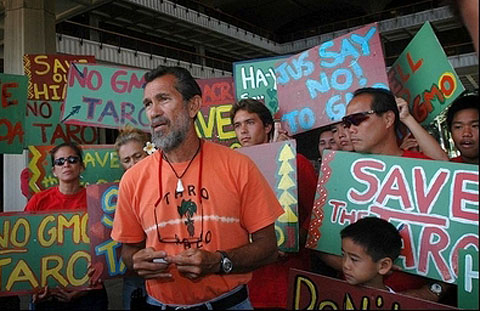by Lester Chang on 16 August 2007 in The Garden Island News
During a rally outside the Historic County Building Wednesday, a handful of residents urged visiting state legislators to halt genetically modified organism laboratory testing of taro by the University of Hawai‘i.
“We want to make our intentions known to Kaua‘i that we don’t want GMO crops, especially GMO taro, on our island,” said Jeri Di Pietro, accompanied by eight The group attempted to get their message across to 13 members of the state House of Representatives who were on Kaua’i yesterday for a two-day visit to tour agricultural and economic development projects. The group was loosely tied to GMO Free Kaua‘i, which strives to keep genetically
modified crops off the island.
GMO technology supporters say there exists no evidence that altered foods are dangerous. However, critics argue that genetically modified organisms should not be eaten because their long-term effect on humans is still unknown.
Wayne Nishijima, associate dean with the University of Hawai‘i’s College of Tropical Agriculture and Human Resources, said the university has reached an agreement with the Royal Order of Kamehameha at this time not to conduct GMO testing of known Hawaiian taro varieties.
“Because of the moratorium, we are not touching the Hawaiian variety,” he said.
Nishijima said the university division has genetically modified Chinese taro known as bun long to make it more resistant to disease. It could begin work on Hawaiian varieties in the future, but only with approval by Hawaiian leaders, he said.
Genetically modified foods are produced from organisms with altered genome, or chromosomes. The process involves taking the DNA from one organism, modifying it in a laboratory, and inserting into another organism.
Carrying placards and standing with banners denouncing genetically modified crops, the group yesterday wanted to meet with state Rep. Clift Tsuji, D-3rd (South Hilo, Pana‘ewa, Puna, Kea‘au and Kurtistown), and other legislators to state their stand.
Di Pietro said the group wanted Tsuji, who heads the House Committee on Agriculture, to reconsider a failed bill proposing a 10-year moratorium on genetically modified laboratory testing and field work in Hawai’i.
The legislators attended a meeting of the Kaua‘i County Council’s Finance and Economic Development Committee yesterday as part of a courtesy call. While in attendance, they listened to a presentation by county officials on the future of the island’s tourism industry.
But none of the legislators reportedly met with the group, boarding a bus after the meeting to visit project sites on the island, county officials said.
“We’ll get opinions from both sides of the (GMO) issue,” Tsuji said yesterday. “That is why we’re here (on Kaua‘i).”
Nishijima said the university began genetically modified testing on the Chinese taro at its facilities a “couple of years ago.”
But Di Pietro doesn’t see that type of testing as having much value, as “it is not something we want.”
“The university sees (genetically modified testing of taro) as a small risk,” she said. “We see it as a big risk. Farmers don’t want it. Consumers don’t want it. You can’t reverse the effects.”
Di Pietro also said taro eaten by Hawaiians is as important to today’s generation as it was to ancient Hawaiians, as taro is a main staple for them.
Thomas Silva Jr., a Kalaheo resident whose wife’s family has grown taro for generations, said genetically modified taro borders on being sacrilegious.
“By taking away the taro and changing it, you are taking away the culture of Hawaiians,” he said.
Francine Weigle, who is part Hawaiian, said she tended to taro patches in Hanalei Valley as a girl, and that “the pure taro is better than anything else.”
Anne Ponohu said growing Lihuaali‘i taro in the traditional way is a top priority for her, as the rare pink taro was served to Hawaiian royalty. The taro species is unique because it bleeds a red-colored liquid whenever a leaf is pulled off, she said.
“It grows mostly in Hanalei and is mostly cultivated by older Hawaiian families,” she said.
Also calling for a ban on GMO testing, Marge Freeman said having stocks of taro or corn that are not treated will go a long way toward protecting crop production in Hawai‘i and elsewhere in the world.
“Bio-diversity is an important part of keeping crops healthy,” she said.
Nishijima said the research will continue, as no evidence has come forward to prove that generically modified crops have adversely affected the health of consumers. GMO advocates have said it is too early to tell whether such treated crops will do harm.
Di Pietro said banning the technology is the best option, adding that its use poses a bigger problem than scientists can control.
15 August 2007 on KGMB 9 Television Honolulu
On Kauai Wednesday, a protest was held at a council hearing about genetically modified crops.
About 20 people gathered to urge lawmakers to block the development of a taro research center on Kauai. Protestors say experimenting with the genetics of plants threatens the environment. And some native Hawaiians regard taro as a sacred plant and an ancestor of their culture.
"When you modify something that belongs to a culture then you lose the culture. It disappears," said protestor Tommy Perreira. "So by touching our taro you touch us. If you modify our food source you modify us."
Protesters want lawmakers to pass a 10-year ban on all genetic taro research on Kauai.
On the other side, scientists say they're creating a kind of taro that's easier to grow and more resistant to disease.
|
